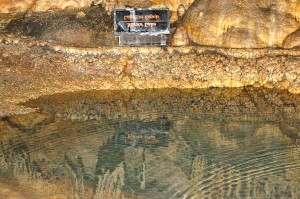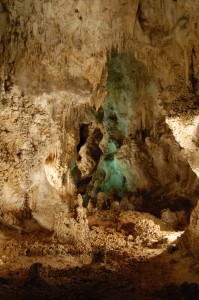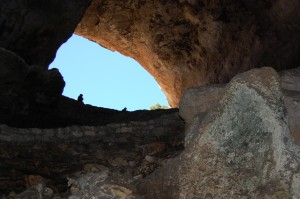Each twist back and forth down the path takes us deeper into the dark earth.
“Momma, hold my hand.” I reach for her small hand. And we step carefully down the paved trail. As the light disappears behind us and our eyes adjust, incredible shapes emerge from the shadows.
“I’m scared.” Of course she is. Going down the steep, narrow pathway, with all the light receding into a small blue window above leaves me feeling the threats of all things subterranean, too.
I keep stopping to gawk and lift my camera to catch the amazing underground world. A flash is too much light, overexposing the rocks. And pictures with no-flash are not cooperating with the artificial light fixtures installed for tourists like me.
Less than 15 minutes into Carlsbad Caverns it hits me. I am walking into a gigantic metaphor of the human mind. As we go deeper the idea of formation takes on fantastic new meaning. How have I missed this connection before?
All around us are the results of millions of years of slow geological change: rock formations. Everywhere I cast my eyes are the manifestations of ancient processes of earth moving, water flowing, chemical reactions reshaping this underground world, drip by drip. Carlsbad is a mostly dry cave now; however, at one time it was filled by sulfuric acid which cut away the vast passageways and rooms of the cavern. Over 33 miles of passages have been mapped thus far.
Walking through the dark, quiet underground world reminds me of contemplative prayer in darkness, stillness and silence. The passageways into the human mind go on as unending as the hundreds of caves that are carved out under the Guadalupe Mountains. I also think about the dissent into the recesses of the personal past or psychological defenses in therapy. Down into the dimly lit world of thoughts, feelings, narratives, wounds, defenses and adaptive beliefs used daily, hourly, minute by minute in coping. Most of these cognitive functions remain mostly hidden in our unconscious minds, like the bottom of a pool in a deep cave.
 The underground world was opened up millions of years ago, but in a more recent process (10,000 years ago) the cave began to “decorate itself.” Because Carlsbad was not created by an underground river flowing through it, there is no river or even dry river bed at the bottom of the cave. The water that gets in does so slowly by soaking down through the ground after rain and snow fall on the Guadalupe Mountains above. The mountains are part of a high desert, so the water flow is minimal, although rain and snow were more frequent and powerful in millennia past.
The underground world was opened up millions of years ago, but in a more recent process (10,000 years ago) the cave began to “decorate itself.” Because Carlsbad was not created by an underground river flowing through it, there is no river or even dry river bed at the bottom of the cave. The water that gets in does so slowly by soaking down through the ground after rain and snow fall on the Guadalupe Mountains above. The mountains are part of a high desert, so the water flow is minimal, although rain and snow were more frequent and powerful in millennia past.
The formations themselves in Carlsbad are beautiful. No two are just alike. There are multiple shapes, colors, sizes, and configurations. Some hang from the ceiling (stalactites). Others appear to push up through earth itself (stalagmites). Other shapes and forms are given names like straws, columns, popcorn, and draperies. And the various formations or areas of the cave are named like the fantasies or imaginations of the mind: Fairly Land, Mirror Lake, the King’s Palace, the Queen’s Chamber.
While walking through cavern, the metaphor that strikes me as most helpful comes at the point of expanding my own imagination about the apparently infinite variety of possible shapes, sizes, colors and beauty of each “formation” found in a cave or in a human mind. The formation that theological educators and spiritual directors like to talk about is also a slow, residual process of shaping people into pastoral leaders. This formation is spiritual as well as material and cognitive. It includes shaping thoughts, feelings and neural pathways in a person over a long stretch of time.
 On the “King’s Palace” tour we see other large chambers that were used for dances, weddings and parties a hundred years ago. We hear stories and fables of Jim White, a cowboy and first known European settler in the area to explore and exploit the cave. One story goes that he nearly got stuck deep in the cave when his lantern went out and he only had three matches. The first match allowed him to locate the lantern. The second match failed to light. The third one relit the lantern and helped him survive. The moral of the story, says our guide Ranger Erin, is to have at least three sources of light when going into the cave.
On the “King’s Palace” tour we see other large chambers that were used for dances, weddings and parties a hundred years ago. We hear stories and fables of Jim White, a cowboy and first known European settler in the area to explore and exploit the cave. One story goes that he nearly got stuck deep in the cave when his lantern went out and he only had three matches. The first match allowed him to locate the lantern. The second match failed to light. The third one relit the lantern and helped him survive. The moral of the story, says our guide Ranger Erin, is to have at least three sources of light when going into the cave.
After that story, Ranger Erin takes us into the “Queen’s Chamber.” She tells a few more stories while we all sit down on stone benches. Then she switches off all the lights. We sit quietly in the dark for several minutes. At this point my daughter is not afraid, but of course she is sitting in my lap. That helps.
Like the cave, formations of embodied habit and thought are within us whether we can see them or not. Having enough light and a knowledgeable guide is essential for going into the depths of one’s mind, memory or internal space which is full of formations. The formations are part of years upon years of slow and reinforcing change.
As a metaphor for the human mind, the cave is striking for its apparent infinite variety and presence of both open space and geological formations. It also sits without disturbance in complete silence and darkness. The apparently empty space is filled by of sacred and beautiful presence.




